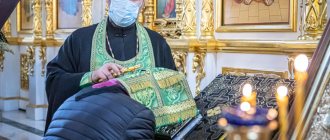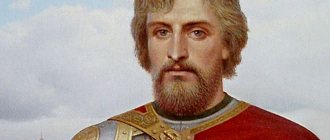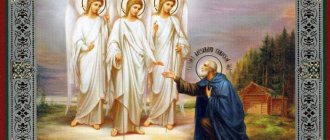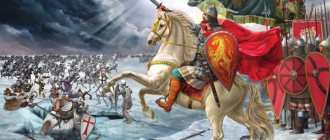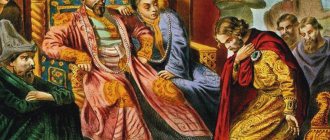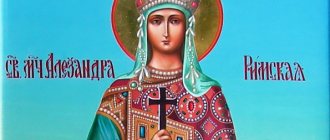Shmeman Alexander Dmitrievich (1921-1983) - Russian modernist theologian, participant in the ecumenical movement. The founder of the direction of “Orthodox” modernism, known as “liturgical theology”.
In 1928 he left Estonia and, after a short stay in Belgrade, settled in Paris in 1929. He received his secondary education in the Russian cadet corps in Versailles (1930-1938), and then at the French Lycée Carnot (graduated in 1939). Studied at the Sorbonne.
He was a subdeacon, Metropolitan. Eulogius (Georgievsky). From October 22, 1946 - deacon, from November 20, 1946 - priest, ordained archbishop. Vladimir (Tikhonitsky). In 1946 - 1951 - assistant rector of the Church of St. Constantine and Helena in Clamart (France), editor of the diocesan magazine “Church Bulletin”. Since 1951 - rector of the Church of the Nativity of the Virgin Mary in Petit-Clamard (France). Since 1951, it has been under the jurisdiction of the North American Metropolis. He was a member of the Metropolitan Council (1964-1983). Since 1953 - archpriest, since 1970 - protopresbyter. Founder (together with Father John Meyendorff and Archbishop John (Shakhovsky) of the American Autocephalous Church (1970).
Childhood, adolescence and young adulthood
Born on September 13, 1921, he grew up and was brought up in a fairly famous family.
His father, Dmitry Nikolaevich, came from the family of a statesman, Senator Nikolai Eduardovich Shmeman. He faithfully served his Fatherland in the Semenovsky Life Guards Regiment. The fire of the February and then October revolutions of 1917, which turned the political and social situation in the country upside down, forced him to emigrate from Russia following his beloved wife, Anna Tikhonovna.
Dmitry Shmeman's family settled in Estonia. Here, in the city of Revel, the future Protopresbyter Alexander was born.
The stay in Estonia lasted until 1928. Then, by the Providence of God, the family moved to Belgrade; then to France, to Paris, where she settled.
Since 1930, Alexander trained at the Versailles Cadet Corps. Here, in addition to acquiring theoretical and practical knowledge, he was introduced to responsibility, discipline and self-discipline.
After graduating from the cadet corps in 1938, in 1939 he continued his education at the Carnot Lyceum.
influence
O. Alexander Schmeman is one of the candidates for Gnostic prophets:
We are heirs to Father Alexander's vision, ministry and mission... His prophetic vision of what the Church should be in its entirety has penetrated us[1].
- Metropolitan Jonah (Paffhausen)
memory
The historical path of Orthodoxy in Russia after 1917 (conference) (May 31, 1993, St. Petersburg, Russia, John (Snychev), Kochetkov Georgy Serafimovich, Grigoriev Dmitry Dmitrievich, Chaplin Vsevolod Anatolyevich, Meyendorff Pavel Ivanovich)
On the Path to the Priesthood
Having a firm intention to master the theological knowledge that had long interested him, he decided to enter the Paris St. Sergius Orthodox Theological Institute, which was done.
Founded in the 20s (XX century) with the active participation of representatives of the Russian diaspora, the institute was one of the most important spiritual and educational centers of Orthodoxy in France and even in Europe.
During his studies, Alexander proved himself to be a talented, purposeful student. He spent a lot of time reading books and soulful conversations. Trying to comprehend all the required disciplines, he gave special preference to the history of the Church.
So he became a student of A. Kartashev, a prominent historian, a famous public figure, who emigrated from Russia for the same reasons as many of his contemporaries.
Kartashev stood at the origins of the creation of the Theological Institute and was sincerely devoted to science. Under his wise and experienced guidance, A. Schmemann compiled and defended his Ph.D. thesis. The central subject of study of this work was Byzantine church history.
In the period from 1945 to 1951, Alexander Dmitrievich worked at the St. Sergius Institute as a teacher of Church history. The desire to teach the material deeply, accompanied by the ability to clearly and clearly express thoughts, made him an object of respect both from the student body and from the teaching staff.
In January 1943, A. Schmeman tied the knot with the granddaughter of Archpriest Mikhail Osorgin, Ulyana (Yuliana) Sergeevna. The marriage turned out to be happy. Their marital union lasted more than forty years. In 1945, Ulyana gave birth to a son, Sergei. And daughters: in 1944 daughter Anna, and in 1948 Maria.
Addressing critical issues
The central theme of Father Alexander’s works is the problem of spiritual existence for man, as well as the ability to distinguish the true teaching of Christ from the false. Religion, according to Protopresbyter Schmemann, is a simultaneous manifestation of the thirst for the divine and the ability to make a sacrifice for the sake of the Heavenly Kingdom.
- Creating literary works, Father Alexander repeatedly analyzes eras of crisis in the Orthodox consciousness. He connects this fall with the replacement of true aspiration towards the Almighty Creator by pseudo-religiosity, ostentatious piety, and unquenchable egocentrism. The author compares such misconceptions with extensive and arrogant talk about “spirituality,” slavery and fear.
Books by Alexander Schmemann - Modern Christianity is overly immersed in idle talk and dialogue about the problems of religion, while abandoning the true joy of knowledge. The people began to perceive the Church as an ordinary religious institution, and not as evidence of the existence of God. The author perceives Western Christianity as an organization that is aimed, first of all, at the pedantic execution of all required rituals. This dulls the sense of divinity coming from the Gospel itself.
- Protopresbyter A. Schmemann notes with amazing accuracy that the real religious world can easily do without knowledge of the One God, but cannot exist without idols, “gods”, into which the terms “Church”, “piety”, “faith” gradually turn.
- Father Alexander states: “The culture of any era, like a mirror, reflects the religious attitude of people towards their own lives.” A Christian is obliged to consider his actions through the prism of the course of history. Religion must judge the culture of the present century, expose its sinfulness, and then ennoble it, because the Christian worldview is above materialistic ideas. However, he calls the denial of world culture by Orthodoxy barbaric, because Christ did not abandon the ignorant and lost people, but wanted their healing.
On a note! The literary heritage of Protopresbyter A. Schmemann gives readers a unique experience of spiritual and moral understanding of personality, cultural background, and history. His writings highlight the testimony of the Messiah and the Church gained through individual experience.
Diaconal and priestly ministry
In 1946, Alexander Dmitrievich was awarded the rank of deacon, and some time later - to the rank of priest.
From the same year, he began to work as an assistant to the rector of the Orthodox Church of Saints Constantine and Helen, located in Clamart.
Father Alexander combined his pastoral and scientific-teaching activities with the activities of the editor of the publication “Church Bulletin”.
In 1951, by decision of the church authorities, he was appointed rector of the Church of the Nativity of the Virgin. The temple was located in Petit Clamart. Father Alexander's fame as a fiery preacher contributed to attracting residents from other regions (in addition to local parishioners) to the church's arches.
In the same year, 1951, he moved, along with his wife and children, to New York City and took the position of assistant professor at St. Vladimir's Seminary in the USA, at the department of liturgics and church history. Due to the prevailing circumstances and the personal desire of the priest A. Schmemann himself, the North American Metropolis accepted him under its jurisdiction.
His high educational level and popularity contributed to his being awarded the title of honorary doctor of ecclesiastical sciences by a number of educational institutions: the New York General Theological Seminary, the Boston Theological Institute of the Holy Cross, and Easton Lafayette College.
In 1953, Father Alexander was elevated to the rank of archpriest.
In 1959 he successfully defended his dissertation for his doctorate. The content of the work reflected research in the field of liturgical theology.
In 1962, he was entrusted with the responsible post of head of St. Vladimir's Seminary. He worked in this place until the end of his earthly life. During his activity, a number of productive measures were taken to improve the quality of seminary education and the level of internal discipline.
In addition to scientific, pastoral and writing activities, he took part in the work of Radio Liberty, where he hosted a special educational religious program.
Since 1964, he has been a member of the Metropolitan Council. While in this post, he played an important role in forming the foundations and recognition of the autocephaly of the Orthodox Church in America.
In 1970, by decision of the church leadership, he was elevated to protopresbyter.
The death of Alexander's father occurred while he was in New York, on December 13, 1983.
views
Capax Dei
And finally, the last experience is the experience of Redemption, which God performs, being in the midst of His creation in time and history, and which, freeing man, making him capax Dei - capable of new life - is the salvation of the whole world. For as soon as the world rejects - in man and through man - its self-sufficiency, as soon as it ceases to be an end in itself and, as befits “this world,” the world of “the day,” it will become what it was intended from creation and what it truly becomes in Christ. : the object and instrument of sanctification, communion and bringing man to the eternal Kingdom of God[2]:92.
Man is a spiritual being, which means: a being that not only eats, and even not only thinks, but also a being destined to possess spiritual values. What are these values? In the old fashioned way they can be listed as follows: truth, goodness, beauty. Values are not necessarily pragmatic, but they carry and demonstrate happiness in themselves[3]:70.
Soul = body
Having “spiritualized” itself, Christianity turned into “one of the religions” serving people and their “spiritual needs,” while it entered “this world” as the victorious gospel of the Kingdom of God, the destruction of death and the salvation created by the God of the world. Like other “spiritualistic” religions, Christianity focused all its attention on the “soul,” contrasting it with the “body” [4]: 42-43.
O. Alexander Schmemann denounces “as false, as contrary to the Christian faith, the opposition, the separation from each other of “soul” and “body,” “spiritual” and “material,” “sacred” and “profane,” “religious” and “secular” . The whole person is sanctified and anointed to be fully a temple of God, a service to God and the world”[4]:72.
Everything “material” is transformed and spiritualized, and everything spiritual is endowed with the power to carry out this transformation[2]:202.
Capax Dei, Anti-theoreticism, Atheistic monism, Theology (in modernism), The visible reveals the invisible, Meeting with God, Soul = body, Natural supernatural, Liturgy (in modernism), The world as a sacrament, This world = another world, Mysticism of completeness, Mysticism of process , Monism, Non-event, Relation, Against the division of the Church into teaching and teaching, Self-redemption, Secular holiness, Sympathies, Synergy, Coincidence of opposites, Means-end, Third reality, Universal symbolism, Christianity - a religion of defeat, Church (in Gnosticism), Man -priest, Miracle (this-worldly)
authoritative authors
Afanasyev Nikolay Nikolaevich • Bott Bernard • Buber Martin • Bouyer Louis • Weil Simone • Gellink Joseph de • Dugmore Clifford William • Daniélou Jean • Delee Hippolyte • Dix Gregory • Dostoevsky Fyodor Mikhailovich • Zheludkov Sergiy Alekseevich • Zander Lev Alexandrovich • Casel Odo • Callistus ( Ware) • Cassian (Bezobrazov) • Cyprian (Kern) • Congar Yves • Kuhlmann Oscar • Lossky Vladimir Nikolaevich • Loisy Alfred • Parsh Pius • Rousseau Olivier • Florovsky Georgy Vasilievich.
Martin Buber
The true purpose of the Holy Spirit is to bind and unite, but not in the image of an “objective” connection, but through the revelation and discovery of the hidden interior of all things, through the restoration and transformation of the “object” into the “subject” (“it” into “you”, to use terminology of Martin Buber).[5]
Essays
- Church and church structure. - Paris, 1949. 24 p.
- The sacrament of baptism. - Paris: Publication of the “Church Bulletin”, 1951. 31 p. (2nd edition - M.; Paris: Krutitskoye Compound; YMCA-Press; Russian Way, 1996. 46 p.).
- The historical path of Orthodoxy. New York: Publishing house im. Chekhov, 1954. 388 p. (2nd edition - Paris: YMCA-Press, 1985; 3rd edition - Paris: YMCA-Press, 1989; 4th edition, reprint - M.: Pilgrim, 1993) (English translation - London: Harvill Press, 1963. 359 p.).
- Introduction to Liturgical Theology. - Paris, 1961. 247 p. (2nd edition - M.: Krutitskoye Compound, 1996. 247 p.) (English translation (London; Portland (Me.): The Faith Press; The American Orthodox Press, 1966. 170 p.); 2nd edition (Leighton Buzzard (Beds.): The Faith Press; New York: St. Vladimir's Seminary Press, 1975. 170 p.)).
- For the Life of the World. - New York, 1963 (Russian translation - For the Life of the World. - New York: Religious Books for Russia, 1983. 103 pp.; 2nd edition - Vilnius: News, [199_]. - 103 pp.; 3rd edition edition - Elektrostal: Polygram, 2001. 89 p.).
- Ultimate Questions: An Anthology of Modern Russian Religious Thought. - New York etc.: Holt, Rinehart and Winston, 1965. 310 p. (composition, introductory article).
- Sacraments and Orthodoxy. - New York, 1965 (English translation - The World as Sacrament. - London, 1965. 142 p.).
- Great Lent. — Crestwood (NY): St. Vladimir Seminary Press, 1969. 124 p. (Russian translation - Great Lent - M.: Moskovsky Rabochiy, 1993. - 111 p.) (French (Le Grand Careme. - Begrolles-en-Mauges: Bellefontaine, 1974), Dutch (1976) translations).
- Of Water and the Spirit: A Liturgical Study of Baptism. — Crestwood (NY): St. Vladimir Seminary Press, 1974 (London: SPCK, 1976. 169 p.) (By Water and Spirit: On the Sacrament of Baptism / Trans. - M.: Gnosis; Pilgrim, 1993. - 224 p.; 2nd edition - M.: St. Tikhon's Theological Institute, 2000. 199 pp.; 3rd edition - M.: Palomnik, 2001. -223 pp.). (French translation - D'Eau et d'Esprit. - Paris: Desclee de Brouwer, 1988. 212 p.).
- Eucharist: The Sacrament of the Kingdom. - Paris: UMSA-Press, 1984. 304 p. (2nd edition, reprint - M.: Palomnik, 1992; 3rd edition - M.: Palomnik, 2001). (French (L'Eucharistie, sacrement du Royaume. - Paris: UMSA-Press; OEIL, 1985. 276 p.), English translations).
- Church, world, mission: Thoughts on Orthodoxy in the West / Translation from English. -M.: St. Tikhon's Theological Institute, 1996. -267 p.
- Sermons and conversations. -M.: Pilgrim, 2000. -207 p.
- Introduction to theology: A course of lectures on dogmatic theology. - M.; Paris: Orthodox St. Tikhon's Theological Institute; Orthodox St. Sergius Theological Institute; 1993. 48 p. (2nd edition - Klin: Christian Life, 2001. 62 p.).
- The Journals of Father Alexander Schmemann: 1973-1983. — Crestwood: St. Vladimir's Seminary Press, 2002 (Russian edition, expanded and supplemented - Diaries: 1973-1983. - M.: Russian Path, 2005. - 717 pp.).
About him
- R. Vershillo. Worldview about. Alexandra Shmeman
- On the website “Two Cities”
- O. M. Pomazansky. Ecumenics against the background of Orthodox liturgy
- O. Rafail (Karelin). About monastic avant-garde
- P. Cancer. Water and Spirit, or about diluted Christianity
- R. Vershillo. Ideology o. Alexandra Shmeman
- R. Vershillo. Romanticism, pantheism or atheism?
- R. Vershillo. Universe and mythological consciousness
- R. Vershillo. To be or not to be?
- R. Vershillo. Have faith in God
Relatives
Shmeman Alexander Dmitrievich came from a noble family that was forced to leave the Russian Empire after the revolution.
- Grandfather Nikolai Eduardovich Shmeman (1850-1928) was a member of the State Duma.
- Father Dmitry Nikolaevich Shmeman (1893-1958) was an officer in the tsarist army.
- Mother Anna Tikhonovna Shishkova (1895-1981) came from a noble family.
Alexander Schmeman was not the only child in the family. Twin brother Andrei Dmitrievich (1921-2008) served as elder of the temple in honor of the image of the Mother of God “of the Sign”. In addition, he headed the society of Russian cadets in exile. He worked in the Metropolis of the Western-Eastern Exarchate of the Patriarchate of Constantinople, acting as secretary of the diocese and assistant representative of the Patriarchate of Constantinople.
Sister Elena Dmitrievna (1919-1926) died in early childhood, without surviving the various difficulties of life as an emigrant.
Charming Russian accent
Covers of books by Protopresbyter Alexander Schmemann “Diaries.
1973-1983” and “The Liturgy of Death and Modern Culture” - Which of Father Alexander’s books is the most important for you personally? Still "Diaries"?
– “Diaries” and “Liturgy of Death.” In my mind they are very connected.
– Are there any things in Father Alexander’s texts that you disagree with?
– He sometimes disagreed with himself, yes. But there are no things there that cause me fundamental objection.
The fact is that he never pretended to be “the sun without spots,” and this is clearly visible in “The Diaries.” He was a man, with his weaknesses, at times he fell into despondency, like all of us. At the same time, he was incredibly charming and very kind. He had a wonderful sense of humor.
– But in the Diaries, Father Alexander writes more than once that he is burdened by “intimate conversations” and people’s attempts to find a confessor in him. What he doesn't like to confess. Did his parishioners and seminarians know about this?
“It so happened that I personally have never confessed to him in my life.” But Father Alexander never showed that the person was unpleasant to him. He could, if necessary, interrupt the speaker, but he never did it rudely; he had colossal restraint. In families like the Schmemanns, this was taught from childhood.
He did not like the so-called “spiritual striptease” and “spiritual conversations” in general; he was frightened by a person’s desire to “have a confessor,” but he always listened to people and tried to help.
"Schmemann's Teaching"
Father Alexander Schmeman at the service.
Photo schmemann.org – When you returned to Russia in 1993, was it difficult to adapt to local church life? Did you regret leaving America?
“We have never regretted returning.” Moreover, very soon a metochion of the Orthodox Church in America appeared in Moscow, where our beloved priest, Father Daniil Gubyak (Protoresbyter Daniil Gubyak (1926–2021), cleric of the Orthodox Church in America, the first rector of the Moscow metochion of the Orthodox Church in America, came to serve ( 1994–2001) – editor’s note).
It took me a long time to get used to Church Slavonic, I couldn’t understand why the priests read the Gospel with their backs turned to people, and generally somewhere out there, far away. And why are the Royal Doors closed?
When I discovered that before each communion I had to confess, even if I had nothing to say in confession, I also became depressed from this. It seemed somehow anachronistic. But, thank God, I found a parish where I feel very good.
– In one of your interviews, you said that if previously you were worried about the hostility towards Father Alexander Schmemann, now you are rather worried about his popularity. Why?
– Because I see that it is put on a pedestal and perceived as some kind of maxim. I once heard that at a certain colloquium they were going to discuss “Schmemann’s teaching on...” - my eyes just went dark! This expression probably made Schmemann himself turn over in his grave a hundred times. Although I understand intellectually that this is normal - apparently, this is clearer to people. They didn’t know him personally and perceive him only through texts.
– When you were preparing his “Diaries” for publication, did you have any doubts or hesitations - is it worth publishing? Is it right to publish them right now?
– The idea of the publication came from the widow of Alexander’s father, Ulyana Sergeevna, and from Nikita Aleksandrovich Struve (editor-in-chief of the journal “Bulletin of the Russian Christian Movement”), and I was simply involved in working on the publication - I had previously transcribed these diaries from notebooks and typed them on a typewriter.
Personally, I always believed that they should be published someday, because the content is something grandiose.
– Did you immediately understand this when you started working with the manuscripts? In general, did this text become a revelation for you when you first read it?
“Of course, it was a shock and a revelation: “Lord, what a blessing that I knew him!” And then much of what was in the “Diaries” shaped my life both in the Church and in the world.
This correlated with Father Alexander, whom I knew, and revealed some depths that I (due to my youth and stupidity) simply could not discern before.
Another thing is that I didn’t think that they would be so popular in Russia. I didn’t think so at all! The fact that this book sold so well was a complete surprise to me. Moreover, this book became popular not only in the church environment. I know people who are generally non-church, even non-believers, for whom this book is a reference book.
– The “diaries” are still published and distributed?
– Yes, we are already preparing the sixth re-release! All previous editions are completely sold out.
– Are there really people left who this book ?
– Well, a lot of time has passed since 2005, when they were published in Russian for the first time.
In my opinion, everyone reads “Diaries”! Both old and young. Both church and non-church.
I think readers are attracted by the very image of Father Alexander, very free, very open... Not an old man with a beard, but a person they understand, for whom there is no contradiction between culture and faith, between culture and the Church.
By the way, one of the best articles about the “Diaries” was written, in my opinion, by Elena Nevzglyadova, the wife of the poet Alexander Kushner, a completely secular person (Nevzglyadova E. The joy that is firmly held in the soul - editor's note).
– Do you think the works of Father Alexander influenced the new generation of priests of the Russian Orthodox Church?
– I think there is such an influence, and it is expressed in freedom, culture, the desire to make the liturgy understandable and accessible to believers. So that the liturgy is a common affair (translated from Greek λῃτουργία literally means “common cause,” editor’s note), and not just the business of one priest locked in the altar. So that all church people recognize themselves as “royal priesthood.”
Literary heritage
The legacy of this scientist attracts the attention of not only domestic readers, but is also an interesting source for Westerners, because it introduces the latter to the eastern ascetic tradition, which has its roots in the desert and dates back to the ancient anchorites.
It is indisputable that the Western branch of Christianity, Catholicism, and after it Protestantism, have lost this connection, succumbing to various secular trends, and have lost the connecting thread between the mystical life of the church and everyday realities. Alexander Shmeman also spoke about this.
The books on which he worked are largely devoted to liturgical issues, because it is in the liturgy and the Eucharist that the greatest contact between man and God occurs, and therefore this is what should attract a Christian and becomes the center of his worldview.
In his works, Alexander Dmitrievich understands the process of evolution of the Christian cult. From the imitation of the liturgical formulas of the Essenes and Therapetians to the unification of liturgical life in the 8th century, there lies a whole abyss of various attempts to create uniformity and verified dogmatic formulas in the sacrament. Alexander Schmemann examines the structure of Christianity in his books. "Great Lent" - an essay devoted exclusively to a mystical rethinking of Christian life, aroused many different opinions in the scientific community.
It is precisely this historical process that is one of the main points of the scientific activity of Alexander Schmemann. Analysis of liturgical monuments can help today's Christians understand modern worship and understand the mystical meaning of this action.
Negative attitude
It is undeniable that Alexander Schmemann's position towards the Soviet Union was rather unfriendly. In his reports and radio broadcasts, he repeatedly accused the country's leaders of having a negative attitude towards the Russian Orthodox Church. It should be noted that the situation between the Russian Orthodox Church and the ZROC was quite precarious. Therefore, the author’s works could not get into the USSR.
The situation did not change after the collapse of the Soviet Union. A number of bishops of the Orthodox Church, belonging to the most conservative party, consider Protopresbyter Alexander Schmemann a heretic and prohibit reading his scientific works.
The most striking example is the ban on reading his works at the Yekaterinburg Theological School. The ruling bishop Nikon anathematized Alexander Schmemann and forbade students to read his works. The reason that led to this decision still remains unknown. In spite of everything, Alexander Schmemann, whose biography remains an example of pastoral service, is the standard for the life of a clergyman.
Bibliography
- Nivière, Antoine. Orthodox clergy, theologians and church leaders of the Russian emigration in Western and Central Europe. 1920—1995. Biographical reference book. -M.-Paris, 2007. - P. 551-552. — ISBN 978-5-85887-206-1
- Balakshina, Yu. V.
Art as the resurrection of time: liturgical aspects of the interpretation of Russian poetry in the diaries of Archpriest Alexander Schmemann // Scientific works. V. 28. Problems of development of the fatherland. lawsuit / RAH; St. Petersburg State acad. Institute of Painting, Sculpture and Architecture named after. I. E. Repin; scientific ed. V. A. Lenyashin, comp. O. A. Reznitskaya, A. I. Shamankova. - St. Petersburg, January - March 2014. - pp. 236-244.
Publishing diaries
In 1973, the first entry was made in a large notebook. Protopresbyter Alexander Schmemann made it after reading the work of F.M. Dostoevsky. "The Brothers Karamazov". In his diaries, he not only describes his experiences regarding various incidents in his personal life, but also talks about the events taking place in the church life of that difficult period. It is undeniable that many church figures found their place in his records.
In addition to all this, the published works contain reflections on the events that the Schmemann family experienced after emigrating from Russia. The publication of his diaries took place in 2002 in English, and only in 2005 his entries were translated into Russian.
“We didn’t use the word “community” back then.”
Parishioners of the Carpathian-Russian Orthodox Church in Detroit listen to Protopresbyter Alexander Schmemann.
March 1962. Photo orthodoxhistory.org – What was Father Alexander’s community like in general?
– We didn’t use the word “community” then. I learned this word and this whole topic of “community” already here in Russia. There, in America, and there we had parishes. Father Alexander, strictly speaking, served in the seminary church. His parish consisted of seminarians and their families. Of course, just people who lived nearby also came there. But all this could not be called a community.
– What is the difference for you between a community and a parish?
– The main thing for me is a personal relationship with Christ, everything flows from here. We are together in church, we are together at the Chalice, we help each other, we are attentive, friendly, we are aware of our commonality as the people of God. In a particular church, we - members of one parish, move and go to another - become members of another parish, with all the attendant responsibilities, in particular material ones.
At the same time, we all have different personal relationships with God, our own circle of friends outside the church. It is all the more interesting and valuable to compose one parish.
– You were new emigrants , having just arrived from the USSR. How did they look at you around Father Alexander? Was there some kind of snobbery, like, we are aristocrats, and you are from the “scoop”?
- No way! Firstly, not everyone around Father Alexander were such aristocrats, and he himself treated aristocrats somewhat ironically... They received us absolutely wonderfully - they helped, took care of us, asked us about everything.
– It is known that among foreigners (members of the Russian Orthodox Church Outside of Russia (ROCOR)) Father Alexander was sometimes treated critically - all these, as they say now, “memes” about “theology with a cigarette in your mouth.” How did Father Alexander perceive this? Were you upset? Offended?
– And I won’t even repeat how we joked about them! Mostly he laughed it off. But, of course, when the Orthodox Church in America received the tomos of autocephaly from Moscow (April 10, 1970 - editor's note), very difficult times came for him. These were not just jokes, but accusations. He was accused of corruption, of Sergianism. There was a lot of aggression, night calls with threats. He was then very offended and hurt.
It was hard for all of us to see this split. Even when Father Alexander died, at his funeral service there were many priests from different churches - both Antiochians and Greeks... And from the ROCOR there was only one person - Father Alexander Kiselev.
– And what depended on which church this or that person chose in the USA - the Orthodox Church in America or the ROCOR?
– I think, from the psychotype: those who were looking for a “continuation of Russia” in the Church, as a rule, went to the ROCOR. And Father Alexander tried to build not a national Church, but a local one.
Besides, America is a big country. If there is only one church nearby, well, that’s where you go.
– Do you think he succeeded?
– It didn’t work out very well. He dreamed of uniting all Orthodox jurisdictions into one local Church, which would, in my opinion, be absolutely correct. It is clear that the rich Greeks and Antiochians did not agree to this. But in the OCA there are Romanians, Bulgarians, and a Mexican diocese (Father Alexander traveled to Mexico and writes very interestingly about this in “Diaries”). And yet the OCA exists as a free supra-ethnic Church, this is extremely gratifying and valuable, and I hope that this will not change.
“Russian” Orthodoxy in America: conflicts and reconciliation
The Russian Orthodox Church Outside of Russia (ROCOR) broke off liturgical communion with the Moscow Patriarchate in 1927. In the same year, the North American Metropolis of the Moscow Patriarchate announced its autocephaly. In the following decades, relations between these three jurisdictions remained tense. In 1970, thanks primarily to the efforts of Protopresbyter Alexander Schmemann, the Moscow Patriarchate restored communion with the North American Metropolis and granted it autocephaly (full ecclesiastical independence), declaring it the Orthodox Church in America. ROCOR reunited with the Moscow Patriarchate only in 2007; Some clergy did not accept this step.

